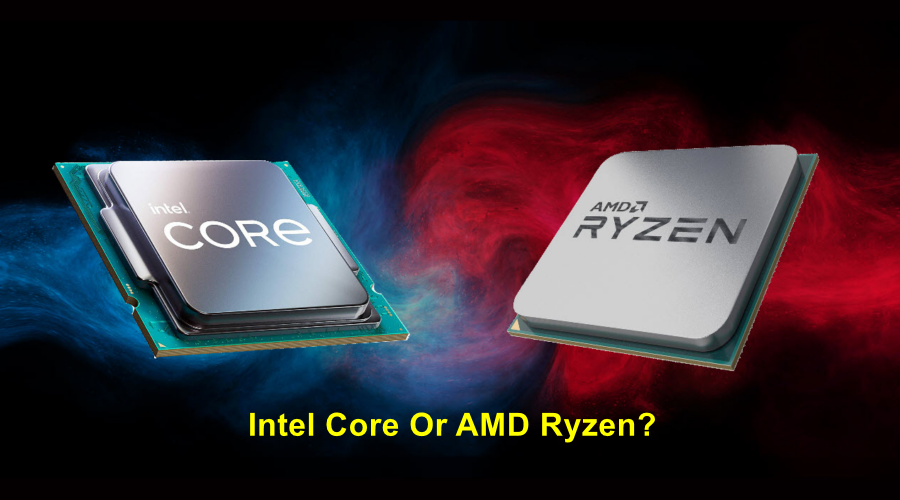In the ever-evolving landscape of computer hardware, the battle between Intel and AMD for processor supremacy has been a constant. For consumers, the decision between Intel Core and AMD Ryzen is akin to choosing a champion for their computing needs. Each brand brings its strengths and features to the table, making the decision a nuanced one. This ultimate buying guide aims to demystify the choice between Intel Core and AMD Ryzen, helping you make an informed decision based on your specific requirements.
Understanding the Basics:
1. Performance:
Performance is a crucial factor when selecting a processor. Intel and AMD have continually pushed the boundaries of speed and efficiency. Benchmark tests and real-world applications can provide insights into the performance of specific models within the Intel Core and AMD Ryzen lineups.
2. Price-to-Performance Ratio:
Evaluating the price-to-performance ratio is essential for budget-conscious consumers. AMD Ryzen processors often offer competitive performance at a lower price point compared to Intel Core counterparts. Consider your budget and prioritize components that provide the best value for your specific needs.
3. Multithreading Capability:
Multithreading allows processors to handle multiple tasks simultaneously, improving overall system responsiveness. Both Intel Core and AMD Ryzen processors support multithreading, with Intel’s Hyper-Threading and AMD’s Simultaneous Multithreading (SMT) technologies. Evaluate the multithreading capabilities of specific models based on your multitasking requirements.
Intel Core: Unveiling the Champion
1. Strong Single-Core Performance:
Intel Core processors are renowned for their robust single-core performance. Applications that rely heavily on single-threaded performance, such as certain games and software, often showcase better results on Intel processors.
2. Wide Range of Options:
Intel provides a diverse range of processor options catering to various needs, from entry-level computing to high-performance gaming and professional workstations. The extensive lineup allows users to choose a processor that aligns precisely with their requirements.
3. Integrated Graphics:
Many Intel Core processors come equipped with integrated graphics, eliminating the need for a discrete graphics card in certain scenarios. This feature is particularly advantageous for budget builds or systems where power efficiency is a priority.
4. Thunderbolt and Wi-Fi 6 Support:
Intel has been a pioneer in introducing technologies like Thunderbolt and Wi-Fi 6. If these features are critical for your computing needs, Intel processors may be the preferred choice.
5. Proven Track Record:
Intel has a long-standing reputation for delivering stable and reliable processors. The brand’s history in the industry instills confidence in users seeking a trusted and established computing solution.
AMD Ryzen: The Contender’s Strengths
1. Exceptional Multithreading Performance:
AMD Ryzen processors excel in multithreading performance, making them ideal for tasks that benefit from parallel processing, such as content creation, video editing, and 3D rendering. The inclusion of SMT across various Ryzen models enhances multitasking capabilities.
2. Competitive Pricing:
AMD has disrupted the market with processors that offer impressive performance at competitive price points. The affordability of AMD Ryzen CPUs makes them an attractive option for budget-conscious consumers seeking a high-performance computing experience.
3. Innovative Architecture:
AMD’s Zen architecture, found in Ryzen processors, has received acclaim for its innovation and efficiency. The continuous refinement of architecture across generations results in improved performance and power efficiency.
4. PCI Express 4.0 Support:
AMD Ryzen processors introduced support for PCI Express 4.0, providing faster data transfer rates for compatible devices such as NVMe SSDs and graphics cards. If cutting-edge connectivity is a priority, AMD Ryzen has the advantage.
5. Strong Presence in Gaming:
While Intel has historically been associated with superior gaming performance, recent Ryzen processors have closed the gap. AMD’s commitment to optimizing gaming performance has made Ryzen CPUs an excellent choice for gaming enthusiasts.
Factors Influencing Your Decision:
1. Usage and Workload:
Consider your specific use cases and workload. If you primarily engage in single-threaded tasks like gaming, Intel Core may be the preferable choice. For content creators or those involved in multitasking, AMD Ryzen’s multithreading prowess could offer a better experience.
2. Budget Constraints:
Your budget is a critical factor in the decision-making process. AMD Ryzen often provides compelling price-to-performance ratios, allowing users to allocate more of their budget to other components or peripherals.
3. Future-Proofing Considerations:
Evaluate the future-proofing aspects of your choice. Consider technologies like PCIe 4.0 support and upcoming software optimizations that may influence the longevity and relevance of your chosen processor.
4. Compatibility and Ecosystem:
Ensure compatibility with other components in your system, such as motherboards, RAM, and graphics cards. Additionally, consider the ecosystem you wish to be part of, as certain technologies and features may be more prevalent in either the Intel or AMD ecosystem.
5. User Preferences:
Personal preferences, brand loyalty, and user experience also play a role. Some users may have positive experiences with a particular brand and prefer to stick with it for consistency.
Conclusion: Making Your Choice
The choice between Intel Core and AMD Ryzen ultimately depends on your unique needs and priorities. Both brands offer powerful processors across various price points, providing users with a plethora of options to suit their computing requirements.
If you prioritize strong single-core performance, a wide range of options, and integrated graphics, Intel Core may be the champion for your needs. On the other hand, if exceptional multithreading performance, competitive pricing, and innovative architecture are paramount, AMD Ryzen emerges as a formidable contender.
Consider the factors outlined in this guide, weigh the strengths of each brand against your specific requirements, and make an informed decision based on your computing preferences. Whether you choose the time-tested reliability of Intel Core or the disruptive innovation of AMD Ryzen, your selection will undoubtedly result in a computing experience tailored to your unique needs.

